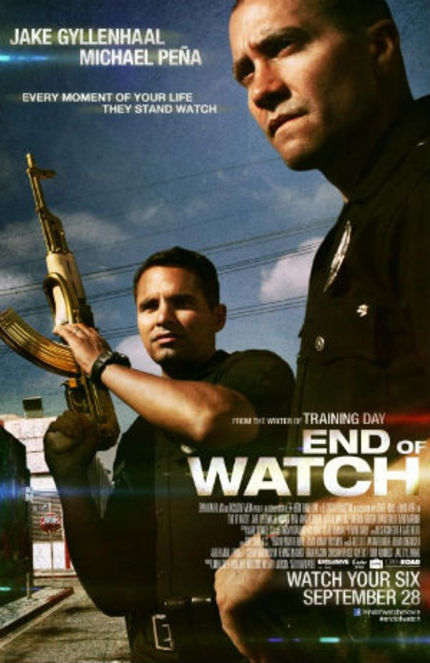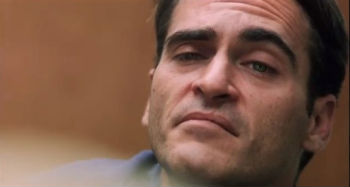Hollywood Beat: David Ayer, Paul Thomas Anderson, and Fascinating Characters

David Ayer's cop drama End of Watch and Paul Thomas Anderson's The Master, which open and/or expand wide in the U.S. on Friday, have more in common than a release date. They both represent the work of filmmakers who are intensely fascinated by fascinating, intense characters.
As nicely laid out by our own Scott Weinberg in his review, Ayer "is clearly and passionately interested in the psychology of modern police officers," and nearly all of the films he has written and/or directed -- The Fast and the Furious, Training Day, Dark Blue, S.W.A.T., and Harsh Times -- "have focused, to some degree, on the nature of being an enforcer of the law in a world where the law is simply not respected anymore." I'll add Street Kings, which Ayer directed but did not write, to that list, which brings into focus the cracked condition in which Ayer's films usually find their respective protagonists, veteran police officers who have fallen prey to their own worst tendencies.
Ayer's work is informed by his experiences living in the notorious South Central neighborhood of Los Angeles, California, as a young man. Clearly he's familiar with the criminal element as well as the struggles involved for the police officers charged with enforcing the law. In Training Day, Dark Blue, Harsh Times, and Street Kings, we see the effect of corrupted veteran officers upon newer officers, who represent all that is potentially good and praiseworthy about the men (and women) in blue.
End of Watch is strikingly different. Again, to quote Mr. Weinberg's review: "End of Watch is not about cops pushed too far, or cops abusing their power for personal gain; it's just about two young Los Angeles cops dealing with a horrifyingly dangerous job." The two cops -- Officer Brian Taylor (Jake Gyllenhaal) and Officer Mike Zavala (Michael Peña) are closer than most married couples. Beat cops who've been partnered since their days in the police academy, the two men playfully banter throughout their regular tour of duty patrolling the mean streets. In between bursts of law enforcement activity, that's how they spend their time: talking and talking and talking.
The dialogue and characters reminded me of the novels of Joseph Wambaugh, a former Los Angeles police office. Similar to Wambaugh, Ayer has a great ear for capturing the vernacular of the street, and the interplay between police officers sounds authentic. End of Watch may almost be too ordinary, but its ruthless efficiency in keeping the focus on the two officers elevates it above the norm.
 The Master also stays resolutely locked on two characters, and it could be said that they, too, are closer than many married couples in certain respects.
The Master also stays resolutely locked on two characters, and it could be said that they, too, are closer than many married couples in certain respects.
World War II veteran Freddie Quell (Joaquin Phoenix) is a man who is, shall we say, in touch with his primal self, which turns him into a drifter, unable to hold a job or establish lasting personal relationships. He stumbles upon Lancaster Dodd (Philip Seymour Hoffman), a charming man who is also in touch with his primal self, but in a more controlled manner, so that he is able to enjoy a somewhat normal family life with his controlling but loving wife (Amy Adams) and two children, a son who "goes along" and a daughter who is eager to break free but lacks the courage to do so openly.
Dodd, AKA "The Master," has founded a religious movement known as The Cause, and much of the film deals with his repeated attempts to help Freddie convert fully to its spiritual precepts. Freddie is a "hard case," but so is Dodd, and their relationship begins to resemble a troubled marriage formed on the basis of a stubborn good girl chasing after a rebellious bad boy, convinced that she can reform him.
At heart, Freddie is related to Daniel Plainview in Anderson's There Will Be Blood and Barry Egan in Punch-Drunk Love and multiple characters in Magnolia, while Lancaster Dodd shares certain personality traits with Eddie Adams (AKA Dirk Diggler) in Boogie Nights (among other things, Lancaster works hard to keep his family together, even as he unwittingly drives them apart).
Like David Ayer, Anderson creates vivid characters who tend toward florid speeches that tiptop past the boundaries of "reality," yet somehow remain grounded, tethered to all-too-common, often poignant, human experiences. Ayer endeavors to paint his pictures with distinctive stylistic brushes; Anderson excels in his command of cinematic language and willingness to suspend traditional rules of narrative storytelling.
Anderson's is the superior picture, but Ayer's is not as easy to dismiss as its premise might suggest. They both represent what's right about the U.S. film business, when pictures that challenge expected notions get financed and released.
"Hollywood Beat" is a weekly column on the U.S. film and TV industry.







